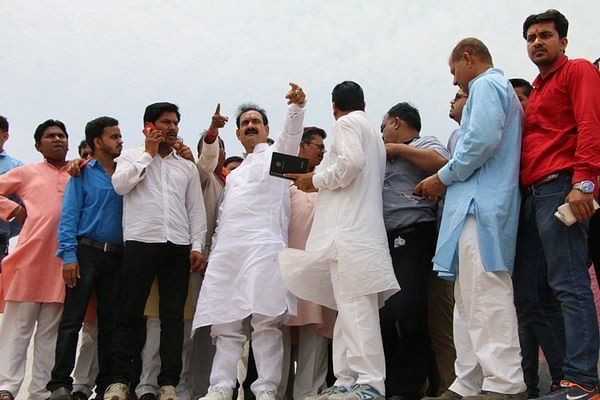The verdict in Narottam Mishra’s case could be critical to how the menace will henceforth be dealt with in the country
Narottam Mishra, a senior minister in the Madhya Pradesh cabinet, is the second politician to be disqualified by the Election Commission for allegedly getting paid news published during his election campaign. A defiant Mishra moved the Supreme Court, which in turn has referred the matter to the Delhi High Court.
With the hearing scheduled for later this month, all eyes will be on the court verdict that could have major legal implications for the use of paid news. The EC is also likely to announce its final order in an earlier case involving former Jharkhand CM Madhu Koda, which may prove decisive on how paid news is dealt with in future elections.
“This will be a test case on paid news,” an Election Commission official familiar with the case told ThePrint. “The position that the court takes on the issue could be critical to how paid news will henceforth be dealt with in the country. The EC had already passed a detailed order, which bears out the extent of collusion in this particular case. What the court says will have considerable implications about how we treat paid news now on.”
The Narottam Mishra case
After a prolonged process, Mishra was disqualified for three years by the Election Commission last month for using paid news articles during the 2008 assembly elections. Mishra won against Rajendra Bharti in the Datia constituency. Bharti, now in the Congress, had gone to the EC accusing Mishra of getting “paid news” published in several Hindi newspapers as part of his campaign.
Even the Madhya Pradesh high court refused to stay the EC order disqualifying Mishra. While he moved the apex court seeking permission to vote in the presidential elections, the plea was rejected.
The PCI defines paid news as “any news or analysis appearing in any media for a price in cash or kind as consideration”.
The 69-page EC order lists how the local administration and electoral office-bearers chose to ignore the publishing of promotional material, disguised as news, in highly-circulated newspapers. It also held up a mirror to the media houses, which published 42 news articles in Datia between November 8 and 27, 2008. All of the articles have now been declared as clear cases of paid news.
All 42 reports—written in favour of Mishra—did not have a reporter’s byline. While some of them were called ‘impact features’, a few of them appeared verbatim in three newspapers. The complainant in the case has even referred to a special ‘election rate card’ that is on offer at newspapers for putting out advertisements, and often enough advertisements disguised as news, during election season.
While Mishra repeatedly denied having made any payment for these articles, it was proven that two rival candidates had made payments for similar types of articles. When the editors of the newspapers were questioned by the EC on this, all of them also denied having published these articles in exchange for money.
The EC order rejects these arguments and observed how paid news is a “manifestation of the pernicious effect of money in elections”.
The EC order also held forth on how the public lends more credence to news articles in newspapers than to advertisements of political parties and candidates. It noted that the publication of such advertisements in the garb of news amounts to “deceiving the electorate” and “militates against the voters’ right to accurate information to enable him to make an informed choice”.
The scale of the menace
The ECI has been writing repeatedly to the law ministry on the issue, seeking that paid news be treated as a cognizable offence, but there has been no movement so far. There are enough figures that point to the growing menace of paid news.
The latest round of assembly elections is a case in point. As per data from the Election Commission, there were 80 cases of paid news in Punjab and 56 in Uttar Pradesh. The other three states that went to polls—Goa, Manipur and Uttarakhand—reported no cases.
Things were no better before. The 2016 assembly elections had 23 confirmed cases of paid news, with 17 in Tamil Nadu, five in Assam and one in West Bengal.
In 2015, seven confirmed cases of ‘paid news’ came up in Bihar assembly elections. It was revealed in Parliament that over 600 paid news complaints, in connection with the 2014 Lok Sabha elections, were forwarded by the EC to the Press Council of India (PCI).
In 2013, Madhya Pradesh confirmed 165 cases, followed by Karnataka at 93 and Rajasthan at 81. The year 2012 saw a deluge of paid news—Punjab with a staggering 523 confirmed cases, 414 in Gujarat and 104 in Himachal Pradesh. UP has seen 97 confirmed cases of paid news in the 2012 assembly elections. And this, EC sources say, may just be the tip of the iceberg.
Sources in the ECI say the toughest challenge is to establish that the news is paid for. There is usually circumstantial evidence, but little proof. Establishing a transaction involving cash or kind is not easy, as it is usually done without any record and promptly denied by both sides if there is any inquiry.



